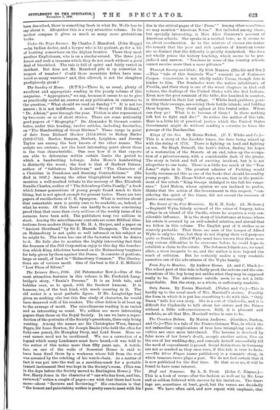The Sunday at Home. (R.T.S.)—There is, as usual, plenty of
excellent and appropriate reading in the yearly volume of this magazine. "Appropriate," we say, because it seems to us to give as practically useful an answer as any publication in existence to the question, "What should we read on Sunday ? " It is not too narrow; it is not indifferent. A serial "Story of Old Holland," "Dr. Adrian," goes through the year. Fiction is also represented by two-score or so of short stories. There are some noticeably good papers of "Biography." Dr. Alexander B. Grosart contri- butes, under this heading, twelve articles, including facsimiles, on "The Handwriting of Great Divines." These range in point of date from Richard Hooker (1554-1600) to Bishop Butler (1692-1752). Baxter, Bunyan, Herbert, Leighton, and Jeremy Taylor are among the best known of the other names. The scripts are curious; not the least interesting point about them is the time characteristic. One sees how it is that experts are able to determine within certain limits the period to which a handwriting belongs. John Howe's handwriting is distinctly the worst; the best is that of Herbert Palmer, author of " Sabbatum Redivivttm" and "The Character of a Christian in Paradoxes and Seeming Contradictions." (He died in 1647.) Among the other biographical notices we may mention a well-merited tribute to the memory of Mrs. Elizabeth Rundle Charles, author of "The Schonberg-Cotta Family," a book which former generations of young people found much to their liking, but is not spiced enough for present tastes. There are two papers of recollections of C. 11. Spurgeon. What is written about that remarkable man is pretty sure to be readable, as, indeed, is what he wrote. Of this there can hardly be a more convincing proof than that more than sixty millions of the weekly issue of his sermons have been sold. The publishers keep two millions in stock. Among the miscellaneous contents are some Biblical illus- trations from modern things by Mr. H. A. Harper, and a paper on "Ancient Shorthand" by Sir E. Maunde Thompson. The writer on Malmesbury is not quite so well informed on his subject as he might be. The town has one of the factories which he denies to it. He fails also to mention the highly interesting fact that the freemen of the Old Corporation enjoy to this day the benefac- tion which King Athelstan bestowed on the Malmesbury burghers for help given by them against the Danes. It consists of portions, large or small, of land in "Malmesbury Common." The illustra- tions are of various merit. One of the best is Sir J. E. Millais's "Lost Piece of Silver."


















































 Previous page
Previous page